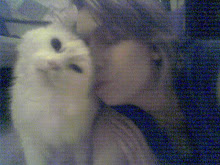And so it is that I have come full circle...
When I started grad school again two years ago, my main research interest was learning disabilities and the use of dynamic assessment to identify children with learning disabilities. Somewhere along the way, my interests shifted to theories of measurement. But, last semester I had a graduate assistantship in the area of disabilities and once again my interests were renewed; but, they were couched in terms of measurement. I was more interested in conducting a measurement equivalence study of items given under accommodations to children with disabilities vs no accommodations for nondisabled peers.
But, now that I've begun this research into the history of intelligence measurement, I've discovered historical views about educating children with learning disabilities that has brought about a conceptual change within me. I had never realized that these historical views were the driving force behind the development of factor analysis, my pet interest. Theorists were so wedded to their beliefs about an innate, inherited, unitary intelligence that they devised statistical procedures to uncover the underlying unitary construct of intelligence in their set of tests. Many went further by deducing that the children on the low end of the intelligence rank could not benefit from education because of the unchangeable nature of intelligence.
However, Thurstone developed the technique of rotating factors, which caused the unitary factor of intelligence to disappear, replaced by multiple, independent, "primary mental abilities." Thus, children could no longer be ranked based on their average score on a number of intelligence tests. Instead, children are considered unique, with varying sets of strengths and weaknesses. And, I presume, educable.
And so it is that I have come full circle...for in order to truly pursue my initial interests in learning disabilities, I needed to undergo a conceptual change regarding my beliefs about the nature of intelligence. The measurement equivalence study I intended to conduct for my dissertation has very scary implications. If I find that students receiving an accommodation experience differential difficulty for certain items, I may conclude that the items are tapping a secondary dimension of cognitive processes in which the students with disabilities are lacking in ability compared to their nondisabled peers. But why? I must learn from the mistakes of my predecessors. First, intelligence, (or math ability or reading ability) is not a unitary construct that can be quantified using a linear scale. Rather, it is a multidimensional construct, in which a linear quantification could obscure the child's true location on the latent trait in reference to other children (think vectors here, not lines). Secondly, nothing about the mathematical abstraction of co-relations among test scores implies an innate, unchangeable mental ability (think reification of constructs here).
Thus, I should be careful that my interpretations of the measurement equivalence study do not lead one to conclude that children with learning disabilities are unable to ever solve certain types of problems due to intractable intellectual deficiencies. A more appropriate interpretation would be the mere suggestion that if the secondary cognitive processes can be identified, then instruction for students with disabilities should include such processes in order to obviate any future performance differentials between disabled and nondisabled students.
Ironically, my interest in dynamic assessments foreshadowed the conceptual change. Historical views have centered on one test score that places limits on students future learning. Dynamic assessments involved pretesting, teaching, and evaluating the outcome of teaching. If no learning occurs, the child is considered to have a learning disability, but in contrast to historical views, the child is expected to learn if given additional assistance.
And so it is that this weekend, starting with an affront to my own abilities, has led to a conceptual change about intelligence that impacts the way I view my own dissertation research. However, I hope that the larger lesson I learn is not to allow my own expectations as a researcher to cloud my interpretations of findings, or to influence my data collection or analysis techniques. I shall walk away from this weekend as a more conservative researcher, who refuses to draw unwarranted inferences or reify constructs.
Labels: conceptual change



